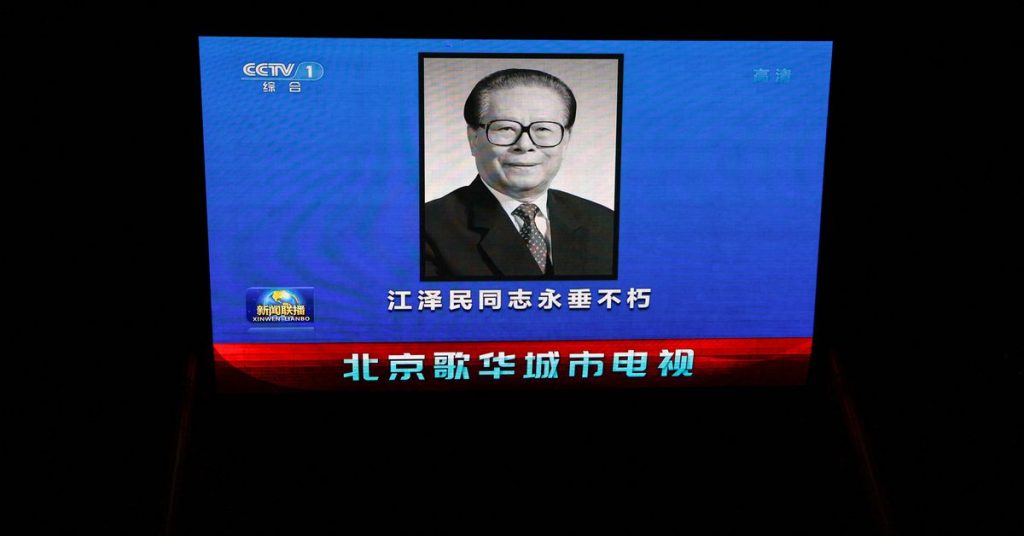BEIJING/SHANGHAI (Reuters) – Chinese newspapers turned their front pages black on Thursday and laid flags to mourn the death of former President Jiang Zemin, while well-wishers laid piles of bouquets outside his childhood home.
Jiang died in his home city of Shanghai on Wednesday afternoon from leukemia and multiple organ failure, at the age of 96.
His death triggered a wave of nostalgia for the relatively more liberal times he oversaw.
No date has yet been set for his funeral.
The ruling Communist Party’s official People’s Daily devoted its front page entirely to Jiang, and carried a large photo of him wearing his trademark “toad” glasses.
“Beloved Comrade Jiang Zemin will never be forgotten,” it said in its headline above a story reprinting the official announcement of his death.
Flags flew at half mast on major government buildings and Chinese embassies abroad, while the homepages of e-commerce platforms Taobao and JD.com also turned black and white.
Mourners placed stacks of bouquets of white chrysanthemums, a traditional Chinese symbol of mourning, outside Jiang’s childhood home in the eastern Chinese city of Yangzhou, a witness told Reuters, speaking on condition of anonymity.
The person added that some people knelt in front of his house as a sign of respect.
On one bunch, he read the words “Grandpa Jiang, rest in peace.”
In Shanghai, where Jiang died, police have closed off the streets, but hundreds of people are still trying to catch a glimpse of a car believed to be carrying his body, according to images circulating on Chinese social media.
In one of the photos, people hold up a black and white banner that reads, “Comrade Jiang Zemin will live forever in our hearts.”
Foreigners are not invited
But China’s state news agency Xinhua said foreign governments, political parties and “friendly people” will not be invited to send delegations or representatives to China for mourning activities.
At one of the largest foreign banks in China, staff have been required to wear black in meetings with regulators, senior staff have been told not to be photographed at parties, and the bank has suspended marketing activities for 10 days, according to a senior executive at the lender, speaking on condition of anonymity. Because he is not authorized to speak to the media.
Jiang’s death comes at a turbulent time in China, as authorities grapple with rare and widespread street protests among residents weary of harsh COVID-19 restrictions after nearly three years of the pandemic.
And China is locked in an increasingly bitter confrontation with the United States and its allies over everything from Chinese threats to democratically governed Taiwan to trade and human rights issues.
While Jiang can have a violent temper, his funny side as he occasionally sings to foreign dignitaries and jokes with them stands in marked contrast to his more rugged successor Hu Jintao and current President Xi Jinping.
“Having an educated person as a leader is really good, RIP,” wrote one user on WeChat, adding a candle emoji.
Some social media users in China have posted photos and videos of Jiang speaking or laughing and articles about his 1997 Harvard speech in English, recalling an era when China and the West were in better conditions.
The US and Japanese governments have expressed their condolences.
US National Security Council spokeswoman Adrienne Watson said that during his two visits to the US as president as well as several other meetings with US officials, Jiang has worked to strengthen relations “while managing our differences — a necessity that continues today.”
Even Taiwan, which Jiang threatened with war games in the run-up to the island’s first direct presidential election in 1996, said it sent its “best wishes” to Jiang’s family, though she added that he “already threatened the development of Taiwan’s democratic system and foreign exchanges by force.”
Reporting by the Beijing and Shanghai newsrooms; Additional reporting by Engin Tham. Written by Yu Lun Tian and Ben Blanchard; Editing by Raju Gopalakrishnan and Michael Berry
Our standards: Thomson Reuters Trust Principles.

“Unapologetic tv specialist. Hardcore zombie trailblazer. Infuriatingly humble problem solver.”







More Stories
Stand News editors convicted in sedition case
Latest Baysail sinking: Mike Lynch’s wife ‘didn’t want to leave boat without family’ as crew investigated
WFP halts Gaza operations after repeated shooting at aid vehicle